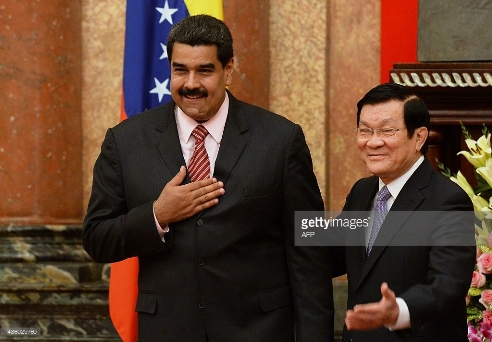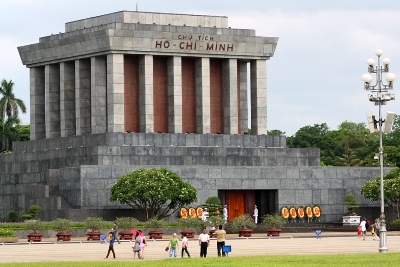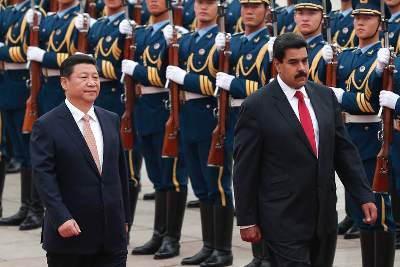President Maduro visits Vietnam and China in the midst of a conflict at home.
Context of Maduro's Visits to Asia Venezuelan-Chinese and Vietnamese cooperation in various sectors is commonly known by folks who follow the Bolivarian Revolution in Venezuela. The details we provide below about President Nicolas Maduro’s current visit to both countries will be of interest. But first, we find the timing and context of these visits by Maduro to be worth noting. On August 19, Colombian Paramilitaries attacked the Venezuelan National Guard (GNB) inside Venezuela, critically injuring 3 GNB officers during the firefight. Last week Colombian paramilitaries carried out a second armed attack on the GNB. Immediately following the first attack, President Maduro ordered the military to the border to protect Venezuela, followed by raids on Colombian hidden paramilitary groups inside Venezuela. He announced that as a result of months of intelligence and investigation there are as many as 30 paramilitary groups currently operating in Venezuela. As a result of the first attack on August 19, paramilitary leaders were arrested and the border was closed in the State of Tachira under a "State of Exception," approved by the National Assembly and since upheld by Venezuela's Supreme Court. In the aftermath, other Colombian operations were uncovered and the government confiscated thousands of tons of food, other "essential needs" products and gasoline, subsidized by the government and smuggled into Colombia to be sold at huge profits at the expense of the Venezuelan people. A recent study by Hinterlaces polling agency revealed that 59 percent of Venezuelans support the closure of the border with Colombia as a necessary measure to combat the smuggling of removal of food and petrol to the neighboring country. The poll results also indicate 60 percent think that the border closure is "effective," 12 percent "very effective" and 15 percent, "somewhat effective. Meanwhile, the US-funded and backed Venezuelan opposition and the US-European corporate media are attacking Maduro for “human rights violations” for repatriating undocumented Colombians who live in the State of Tachira. Their charges of "human rights violations" against the backdrop of the US-NATO wars abroad and oppression at home are enough to make one smile. Actually, most of those who returned to Colombia last week, left voluntarily, as they recognized that Maduro has finally said after years of Colombia’s paramilitary attacks, drug-trafficking, smuggling food, products for personal hygiene in the economic war and gasoline, - “Ya Basta!” … Enough! TeleSUR reports:
But in the corporate media, you won’t read that these people returned to Colombia voluntarily. Rather, you will read that the Venezuelan government "Ruthlessly kicked out poor women and children with only the clothes on their back!" The border action that has taken place during the last two weeks can hardly be reported as a “crisis” but when such conflict takes place with a neighboring country, typically a head-of-state visiting abroad comes home rather than leaving, at least for the sake of appearance. In this case, President Maduro left the country while in the middle of this confrontation at the invitation of Vietnam and China. There’s a strong message in the timing and context of his current trip. The message we read is that Venezuela is secure as the Ministries, National Guard and Military have the situation under control. Let’s move on to the reasons for Maduro’s visit in Vietnam. Maduro in Vietnam First, President Maduro left on Saturday, August 29 for Vietnam and China after his counterparts in the two countries invited him to visit within the past few days. He said that he planned to resume work on “the map” constructed by Commander Hugo Chavez after arrival in the two countries, a map to consolidate true economic independence in Venezuela. Upon arriving in the country on the south Asian sub-continent, the head of state said:
He said that this tour provides in part, for the construction of a map of integration allowing for complementary development in various production areas and the economic momentum of both nations, Venezuela and Vietnam:
Is it any wonder that Maduro’s tour included Ho Chi Minh City where he visited the mausoleum bearing the remains of the revolutionary leader, Ho Chi Minh, the founder of the Democratic Republic of Vietnam, who led the expulsion of the French and later the country's heroic defeat of the US in 1975, bringing to an end that 11 year war.
In Ho Chi Minh City, Maduro gave tribute to this socialist leader of Viet Minh, the Front for the Liberation of Vietnam against foreign domination. The "Front for the Liberation of Vietnam" is juxtaposed with the Bolivarian Revolution" as Venezuela continues to defend it's sovereignty and independence against constant threat and attack by the same US government that once invaded Vietnam. Maduro is holding meetings with his Vietnamese counterpart, Truong Tan Sang; Prime Minister Nguyen Tan Dung and Nguyen Phu Trong, Secretary-General of the Communist Party of Vietnam. He is also visiting the Chamber of Commerce in Vietnam. The two countries have already signed more than 60 agreements, cooperating in energy, petroleum, street lighting, construction of houses, agriculture and more. AVN reported that as of April 2015, Vietnam invested $1.8 billion in its projects in Venezuela, making Venezuela a top investment partner in Latin America according to the Ministry of Planning and Investment’s Foreign Investment Agency. In September, 2012 the Second Meeting of the Intergovernmental Commission Vietnam-Venezuela was held when in particular, Petrovietnam was expanded to include the Dung Quat refinery, the most important in Vietnam. The objective was to process 100 thousand barrels of crude oil per day from the Orinoco Oil Belt with Petromacareo, a joint venture company created for the extraction of crude and improvement of the Junín energy reservoir in Vietnam. Venezuela with Vietnam built “Vietven Illuminations” in the Venezuelan State of Falcon, manufacturing energy saving light bulbs. In March of this year (2015), Venezuela and Vietnam signed two agreements for increasing production of crude oil in the Orinoco Petroleum Belt. These agreements were signed during the Third Meeting of the Intergovernmental Commission Vietnam by Elias Jauá Venezuelan Vice President for Venezuela's "Territorial Development of Socialism" and Hoang Quoc Vuong, Vietnamese Deputy Minister of Industry and Commerce. Following that meeting, a supplementary trade agreement was signed along with the creation of joint ventures to build asphalt plants, the textile industry and a center for engineering. In the energy area, Venezuela and Vietnam agreed to install photovoltaic systems oriented to 50 Venezuelan indigenous communities and the acquisition of more than 10,000 solar water heaters for Gran Misión Vivienda Venezuela which to date has built over 700,000 houses inhabited by Venezuelans who had been living in substandard housing for decades. Maduro in China
Following President Maduro’s visit to Vietnam, he will go to China again where we expect new agreements in finance, trade, petroleum and technology will be inked. Maduro secured another US$5 billion loan from Beijing last April which is being invested in social programs and infrastucture projects. China, Venezuela's largest creditor, has loaned Venezuela a total of US$46 billion since 2007, with $24 billion already paid back. In the same year, Venezuela completely broke ties with the World Bank (WB) and International Monetary Fund (IMF) after paying off its debt to the two institutions five years ahead of schedule. This involved a process that began when former President Hugo Chavez was elected in 1999. In a May Day event in 2007, Chavez declared an economic "third way" anouncing Venezuela's exit from "Washington dominated institutions ... We don't need to be going up to Washington ... We are going to get out. I want to formalise our exit from the World Bank and the International Monetary Fund." But Chavez initiated relations with China in 1999 and they’ve continued to develop their partnership since then. Up to the present, Venezuela and China have signed more than 300 cooperation agreements in areas such as energy, oil, education, health, technology, trade, housing construction, agribusiness and agriculture, infrastructure, industry, culture and sports. Conclusion Meanwhile, “back at the ranch,” we can report that by and large, the people here in Venezuela not only approve of the Maduro government’s crackdown on the Colombian paramilitaries, their criminal gangs and smuggling operations but they are excited to be seeing foods and other essential items returning to the supermarket shelves and pleased to see the government taking dramatic action against the perpetrators of the economic war. People we've interviewed here also say they feel more secure and express pride in seeing their president working for them abroad on a peaceful mission for Venezuela's economic development. Viva Bolívar! Viva Chávez! Viva Maduro! Viva the Multi-Polar World! Sources:
© Copyright 2015 by AxisofLogic.com |


